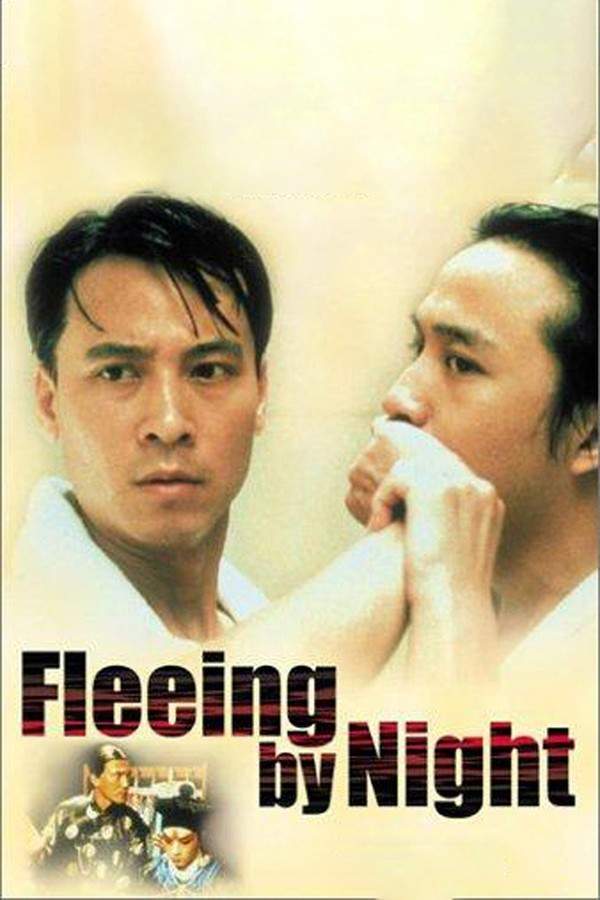Farewell My Concubine 1993

Within Beijing's Opera House, two young performers, Dieyun and Xiaolou, forge a passionate and complex relationship as they navigate the world of traditional Chinese theatre. Their lives become entangled with the dramatic events of twentieth-century China, including the Japanese invasion and the subsequent Cultural Revolution. The film explores themes of love, loyalty, and the struggle to preserve artistic integrity amidst political upheaval, portraying a poignant and sweeping portrait of a nation in turmoil.
Does Farewell My Concubine have end credit scenes?
No!
Farewell My Concubine does not have end credit scenes. You can leave when the credits roll.
Meet the Full Cast and Actors of Farewell My Concubine
Explore the complete cast of Farewell My Concubine, including both lead and supporting actors. Learn who plays each character, discover their past roles and achievements, and find out what makes this ensemble cast stand out in the world of film and television.
External Links and Streaming Options
Discover where to watch Farewell My Concubine online, including streaming platforms, rental options, and official sources. Compare reviews, ratings, and in-depth movie information across sites like IMDb, TMDb, Wikipedia or Rotten Tomatoes.
Ratings and Reviews for Farewell My Concubine
See how Farewell My Concubine is rated across major platforms like IMDb, Metacritic, and TMDb. Compare audience scores and critic reviews to understand where Farewell My Concubine stands among top-rated movies in its genre.

84
Metascore
8.9
User Score


91%
TOMATOMETER

93%
User Score

79
%
User Score
Take the Ultimate Farewell My Concubine Movie Quiz
Challenge your knowledge of Farewell My Concubine with this fun and interactive movie quiz. Test yourself on key plot points, iconic characters, hidden details, and memorable moments to see how well you really know the film.
Farewell My Concubine Quiz: Test your knowledge on the poignant story and characters of 'Farewell My Concubine' (1993).
Who is the main character known for playing femal roles in the opera?
Douzi
Shitou
Laizi
Zhang
Show hint
Awards & Nominations for Farewell My Concubine
Discover all the awards and nominations received by Farewell My Concubine, from Oscars to film festival honors. Learn how Farewell My Concubine and its cast and crew have been recognized by critics and the industry alike.
66th Academy Awards 1994
Cinematography
Foreign Language Film
47th British Academy Film Awards 1994
Best Film Not in the English Language
51st Golden Globe Awards 1994
Best Foreign Language Film
Full Plot Summary and Ending Explained for Farewell My Concubine
Read the complete plot summary of Farewell My Concubine, including all major events, twists, and the full ending explained in detail. Explore key characters, themes, hidden meanings, and everything you need to understand the story from beginning to end.
In a poignant tale of vulnerability and the harsh realities of life, Douzi, a young boy abandoned by his mother who works as a prostitute, discovers comfort in the all-boys Peking opera troupe under the guidance of Master Guan. Here, he cultivates a deep friendship with Shitou, a fellow performer and confidant.
As time elapses, Douzi evolves into a talented dan (female role) performer while Shitou dedicates himself to the demanding art of jing (painted face male roles). During a rehearsal of the play Dreaming of the World Outside the Nunnery, Douzi mistakenly declares, > “I am by nature a boy, not a girl,” which leads to severe punishment. Following this traumatic event, both Douzi and Laizi attempt to flee, yet it is Douzi’s renewed enthusiasm for acting, inspired by a mesmerizing performance, that brings him back to the troupe. Their return, however, does not go unnoticed, and Douzi suffers brutal consequences. The tragic death of Laizi painfully highlights the harsh realities faced by anyone who defies the troupe’s expectations.
As destiny would have it, an agent seeking new talent arrives at the troupe. On this fateful day, Douzi repeats his earlier blunder in front of this influential figure. Quick to act, Shitou encourages him to try again. With newfound resolve, Douzi softly states the correct line: “I am by nature a girl, not a boy,” delivering his performance with fierce passion. This remarkable rendition captures the admiration of his troupe members and promptly attracts the agent’s interest.
Their troupe soon receives an invitation to perform for the illustrious eunuch Zhang, who gifts them an intricately crafted sword he made. In a gesture of loyalty, Shitou promises to one day present this sword to Douzi, honoring the valiant traditions of heroism.
However, the tide turns when Zhang invites Douzi for a private visit, leading to an unsettling incident of sexual assault. While Douzi remains silent about the ordeal, it’s evident that Shitou senses the deep-seated turmoil within him. As they leave Zhang’s estate, Douzi finds comfort in caring for an abandoned infant, who later becomes a disciple of Master Guan, further entwining their fates.
As the years pass, Douzi and Shitou emerge as celebrated Peking opera stars, adopting the stage names Cheng Dieyi and Duan Xiaolou, respectively. Their greatest success comes with the legendary performance of Farewell My Concubine, where Dieyi embodies Consort Yu and Xiaolou portrays the heroic Xiang Yu. Their rise to fame catches the eye of Yuan Shiqing, an esteemed patron who gives Dieyi the very sword he had seen in Zhang’s possession.
Amidst Dieyi’s soaring popularity, his unrequited love for Xiaolou becomes an unresolved ache. When Xiaolou marries Juxian, a spirited courtesan, the relationships among the three begin to fracture, leading to jealousy and betrayal compounded by the chaotic political landscape post-Second Sino-Japanese War.
Following the death of Master Guan, the infant Xiao Si, once abandoned and now under Dieyi’s apprenticeship, continually learns the intricacies of dan roles. With the communist regime’s victory in the civil war, Xiao Si grows fervently loyal to the new government. In contrast, Dieyi’s opium addiction takes a toll, although he eventually finds redemption through the support of Xiaolou and Juxian.
However, Xiao Si harbors bitterness towards Dieyi, fueled by Dieyi’s demanding nature. He usurps the lead role in Farewell My Concubine without consulting Dieyi, leaving him heartbroken and isolated. As the Cultural Revolution escalates, the opera troupe endures a punitive session led by the Red Guards, wherein Dieyi and Xiaolou, pressured by the chaos, accuse one another.
In a desperate move to shield himself, Xiaolou claims he no longer loves Juxian, which devastates her, leading to a tragic ending as she returns the sword to Dieyi before taking her own life. Subsequently, Xiao Si is caught by the Red Guards during rehearsals and mourns the beauty of a world that has been lost to turmoil.
As 1977 approaches, there seems to be a fragile reconciliation between Dieyi and Xiaolou. Their collaboration in Farewell My Concubine resonates with renewed energy. During a rehearsal, as Xiaolou emotionally declares, > “I am by nature a boy,” Dieyi responds with a resonant, “I am not a girl,” encapsulating their shared trauma. As the final notes of the music fade, unease cloaks the pair. In a gripping moment, Dieyi seizes Xiaolou’s sword and, reflecting the fate of a tragic concubine, takes his own life, a haunting reminder of the devastating impact of their unresolved emotional struggles.
Uncover the Details: Timeline, Characters, Themes, and Beyond!

Coming soon on iOS and Android
The Plot Explained Mobile App
From blockbusters to hidden gems — dive into movie stories anytime, anywhere. Save your favorites, discover plots faster, and never miss a twist again.
Sign up to be the first to know when we launch. Your email stays private — always.
Watch Trailers, Clips & Behind-the-Scenes for Farewell My Concubine
Watch official trailers, exclusive clips, cast interviews, and behind-the-scenes footage from Farewell My Concubine. Dive deeper into the making of the film, its standout moments, and key production insights.
Farewell My Concubine Themes and Keywords
Discover the central themes, ideas, and keywords that define the movie’s story, tone, and message. Analyze the film’s deeper meanings, genre influences, and recurring concepts.
Farewell My Concubine Other Names and Titles
Explore the various alternative titles, translations, and other names used for Farewell My Concubine across different regions and languages. Understand how the film is marketed and recognized worldwide.
Similar Movies To Farewell My Concubine You Should Know About
Browse a curated list of movies similar in genre, tone, characters, or story structure. Discover new titles like the one you're watching, perfect for fans of related plots, vibes, or cinematic styles.
Quick Links: Summary, Cast, Ratings, More

What's After the Movie?
Not sure whether to stay after the credits? Find out!
Explore Our Movie Platform
New Movie Releases (2025)
Famous Movie Actors
Top Film Production Studios
Movie Plot Summaries & Endings
Major Movie Awards & Winners
Best Concert Films & Music Documentaries
Movie Collections and Curated Lists
© 2025 What's After the Movie. All rights reserved.

































